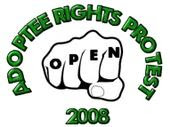
DETROIT NEWS
April 25, 2008
John Doe No. 73 hunts for birth parents
He was abandoned as an infant at a Detroit Crowley's store forty-five years ago.
Kim Kozlowski / The Detroit News
DETROIT -- He was just a few days old when someone put him in a shopping bag and abandoned him in a women's restroom at a Crowley's department store nearly half a century ago.
After someone discovered the newborn, he was taken to Detroit Receiving Hospital and called John Doe No. 73. For two consecutive days, photos of the infant appeared in The Detroit News, with police officer Frances M. Clinepleading for his parents to reclaim the baby.
"There are no problems which can't be solved," Cline said in the Feb. 15, 1963, edition. "It appears (this) was the act of a confused woman who panicked in the face of what seemed insurmountable problems."
No one claimed the infant. He was alone in the world.
Forty-five years later, John Doe No. 73 has identified himself as Richard Lane, a happily married father of two and owner of a successful public relations company in Mainz, Germany. He is now making a plea for his birth parents to come forward.
"I would simply like to be able to understand what forced someone to leave me and my life completely up to chance," said Lane, who grew up in Southgate.
Lane's quest to find his birth parents comes as Michigan lawmakers are pushing to open records to upwards of 20,000 adults who were adopted between 1945 and 1980. These people cannot get copies of their original birth certificates, but a pending bill in the Michigan House seeks to change that.
Lane, 45, has pondered since he was 18 and learned that he was abandoned: Who are his parents? Where are they now? Why does his 20-year-old son, David, have red hair?
He said he never wondered about his birth parents while growing up because his adoptive parents, Charles and Margaret Lane, gave him a family life that felt completely normal. But that changed when he found out he was abandoned.
"It was an extremely lonely feeling," Lane said.
He decided to try to find his birth parents because his adoptive parents are now deceased and he wants his birth parents to know that they taught him an important lesson that shaped his life and the person he's become.
"The first lesson they taught me was to learn to embrace difficult challenges," said Lane. "Now, my return gift is perhaps the message that their decision did not lead to the disaster they may have spent the last 45 years thinking about. I'm fine, and I hope they are, too."
Adoption rules changed
Lane only recently learned he doesn't have an original birth certificate because he was abandoned, so the state bill, if passed, wouldn't help him.
Even so, those who could identify their birth parents if the law was different say they share a kinship with Lane.
"There's a yearning in the heart, in the soul, in your being to know from where you came," said Wixom resident Dave Weaver, who was adopted as a child. He found his mother's identity, but she was already deceased. "It feels like there is a piece inside of me, inside the soul, inside the heart, that is missing. I wanted to fill it. And this is how you fill it: You search to find answers."
Nearly a decade before Lane was born, his adoptive parents started the process of adopting a child through Lutheran Children's Friend Society, now known as Lutheran Child and Family Services of Michigan.
At the time, the Lanes did not qualify for adoption because Margaret had already borne a son, and the agency only worked with infertile couples. But six months after her son's birth, Marge Lane had a hysterectomy and was no longer able to have children.
It was 1954, and the waiting list of people wanting to adopt a child was long -- a sharp contrast to today, when 4,200 Michigan foster children are waiting to be adopted and every year 450 children enter adulthood in the state without ever being adopted.
Lutheran Children Friend's Society changed its policy in 1962 and allowed couples such as the Lanes to adopt children. The Lanes applied again and were approved as adoptive parents in January 1963.
A month later, John Doe No. 73 was abandoned. Detroit was bidding for the 1965 Olympic Games, British surgeons completed the world's first kidney transplant and unwed teenage girls who got pregnant were sent away for nine months to give birth to "illegitimate" children.
"Today there's so much less stigma with having a baby without being married," said Barbara MacKenzie, regional director of the Lutheran Child and Family Service of Michigan.
MacKenzie suspects Lane's mother abandoned him because society scorned motherhood outside of marriage. She likely was young and scared, because those are usually the mothers who abandon infants today.
Finding parents not easy
Whoever abandoned Lane didn't have the option of dropping the baby off at a hospital, fire or police department within 72 hours of birth, as parents have today. Since Michigan passed its Safe Delivery law in 2001, 55 infants have been safely given to authorities, who turn the newborns over for adoption.
Indeed, it was a more difficult time for unmarried pregnant girls because they tried to keep it secret, said Effey Winkel, who at age 91 remembers Lane's abandonment because her late husband, Robert E. Winkel, was president of Crowley's department store.
It's possible Lane's birth parents may have their own families now, Winkel said, and they may not have told their spouses and children about what they did in February 1963. But Winkel hopes at least one of his parents opens their arms to him.
"I would hope they would come forward so he knows them and feels like he has parents," said Winkel, who lives in Arizona.
Lane's longing to reunite with his birth parents is colliding with a world where people often connect more on an electronic level than human, and that may add to his urgency, said MacKenzie, of Lutheran Child and Family Service.
"We're cocooning with our computers and televisions," she said. "Because of that, the need to feel connected is stronger today."
Lane had happy childhood
Because Lane was abandoned, a judge estimated his age and gave him a birthday of Feb. 6, 1963.
Soon after, the Lanes adopted him and renamed him Richard Lane.
He says his parents gave him a happy, healthy upbringing. He attended Christ the King Lutheran School in Southgate and graduated from Southgate High School.
"Our lives are probably much better off that we were adopted," said Michele Lane, Rick Lane's sister, who was adopted three years after him.
"I have no hard feelings against my birth mother as an adult. I thank her. I wouldn't be where I am today or had any of the opportunities if I hadn't been adopted."
Though she is not interested in finding her birth parents, she understands why her brother wants to find his.
Rick Lane says he wants his birth parents to come forward so he can share with them that he turned out all right, holds no grudges and is open to what happens afterward.
"We'll see what happens," Lane said. "Life is usually most exciting when you don't know where all the roads will be taking you."
You can reach Kim Kozlowski at (313) 222-2024 or kkozlowski@detnews.com.
Link to article








No comments:
Post a Comment